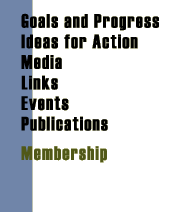Write Your Supplier
Since neither bottled water nor water filters can offer full assurance of safety, it's important that officials strengthen testing and reporting standards. Write to your local water supply company urging them to go beyond the reporting requirements set by the EPA. There are several specific areas that need to be addressed:
• Right-to-Know reports should go beyond reporting infection risks and address risks from contaminants linked to cancers and birth defects.
• Reports must be made available to all customers, whether or not they are directly billed for their water.
• Reports must be available in languages other than English.
• Reports must include information on any contaminants, not just those at levels deemed unsafe by the EPA.
Join Clean Water Action and U.S. PIRG as they lobby for stricter drinking water standards. The EPA is currently revisiting the legal level or arsenic in drinking water and will soon be exploring acceptable levels of other pollutants. Contact U.S. PIRG and CWA for information on when, where and to whom letters and calls of concern should be sent.
Clean Water Action - Lynn Thorp -lthorp@cleanwater.org or 202-895-0420 and US PIRG - Grant Cope - grant@pirg.org or 202-546-9707
Dear ____,
I was very happy to receive the Right-To-Know report from your company, as mandated by the 1996 amendments to the Safe Drinking Water Act. The EPA's increased requirements on water suppliers was a good start to ensuring consumers are informed about the quality of our community's tap waters. However, I hope you will go beyond the minimum standards and consider additional improvements.
The members of our community would greatly benefit if reports:
• Were easily accessible to all consumers, including those who do not pay directly for their water and those ?? that do not speak English.
• Included information on any contamination in drinking water, not just those at levels deemed unsafe
by the EPA.
• Went beyond reporting infection risks and addressed risks from contamination linked to cancers and birth ?? defects.
I know you want to ensure your product is as safe as possible. These Right-to-Know reports are a unique opportunity for your company to inform consumers and improve health. Please take this opportunity to ensure healthy drinking water for everyone.
Sincerely,
Name
Address
Phone Number
E-mail address
|


